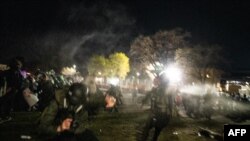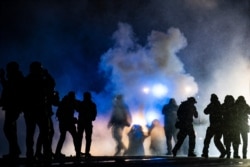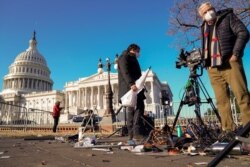In Brooklyn Center, Minnesota, journalists were detained and assaulted last month while covering protests over the death of 20-year-old Black man Daunte Wright.
Minnesota police fired tear gas and pepper spray into the crowds, injuring freelance photographer Tim Evans, who was also tackled and hit in the face by officers. Minneapolis StarTribune photojournalist Mark Vancleave was struck in the hand by a rubber bullet .
The attacks make it difficult for the media to report to their audiences about issues of local or national importance.
"It helps absolutely no one — liberal or conservative, Republican, Democrat or other — when your only understanding of the protest that happened in your city last night comes from rumors on social media," said Frederick Melo, a reporter with the St. Paul Pioneer Press.
"So why treat the media like the enemy just for doing our jobs?" he said.
The attacks on journalists led Minnesota Governor Tim Walz to speak out against the actions of law enforcement in an interview on April 18.
"Democracy cannot thrive without a free and fair and safe press," said Walz. "These individual incidents will be looked into. They just need to make sure they don't happen in the first place."
Incidents like those seen in April are on the rise, said Kirstin McCudden, managing editor of the U.S. Press Freedom Tracker. Last year, approximately 416 journalists were assaulted and 139 detained or arrested — an unprecedented surge, according to the tracker. For comparison, in 2019 the tracker recorded 158 incidents.
"It started last summer with the death of George Floyd, that was May 25, 2020," McCudden said. "May 26, we saw the first assault of a journalist while covering protests. And that week alone, we would see more press freedom violations; more assaults, arrests of journalists than we had captured with tracker and our entire three years previous."
The largest portion of incidents reported in 2020 were tied to journalists covering Black Lives Matter protests and other demonstrations against police brutality. McCudden's team is working to verify more than 930 reported incidents during the Black Lives Matter protests.
From the protests on April 11 for Wright alone, the tracker is looking into about 20 incidents including journalists detained or assaulted, or who had equipment damaged.
On April 11, a Brooklyn Center police officer fatally shot Wright during a traffic stop. After Wright was shot, he drove for a short distance before he crashed his car and died at the scene. Hours later, a crowd of several hundred people gathered in Brooklyn Center, a suburb of Minneapolis, demanding information from police on the incident.
Afterward, protesters headed to Brooklyn Center police headquarters. Officers in riot gear ordered the crowd to disperse and later used tear gas, flash bangs and rubber bullets on the crowd as protesters yelled Wright's name, the Star Tribune reported.
The Brooklyn Center Police Department did not respond to VOA's email for comment.
"What we do know is that protests have always been a dangerous place for journalists. Traditionally, you're more likely to get caught either in crossfire, crowd control munitions or targeted with them as well as cotton kettles. That's when law enforcement closes in and encircles everybody, and then just starts arresting or detaining," said McCudden.
The U.S. Press Freedom Tracker uses a tip hotline, as well as a submission portal, to look into possible incidents of press freedom violations. The team then uses social media or law enforcement accounts to verify the alleged incidents. The tracker uses partner networks to track violations across the country.
The tracker is sponsored by a coalition of press groups, including the Committee to Protect Journalists, Reporters Without Borders (RSF), the Society of Professional Journalists (SPJ) and Columbia Journalism Review.
Law enforcement is to blame for the bulk of violence against journalists, McCudden said, unlike the riot in which supporters of then-President Donald Trump swarmed the U.S. Capitol.
"January 6, there is an interaction with the capital and journalists there were assaulted. Their equipment was put in a bonfire and burned," she said.
"Most of those actions came from private individuals, but otherwise, at Black Lives Matter protests, demonstrations, or against police brutality demonstrations, the majority of the force comes from law enforcement."
News organizations are struggling with how to protect journalists.
In June, RSF and 16 other rights organizations called on U.S. governors and mayors to halt police brutality against journalists, urging "swift measures toward accountability for violations of the First Amendment during violent crackdowns on peaceful protests".
The coalition called for an immediate halt to journalist arrests and assaults, public affirmation of the vital and protected role of a free press, a commitment for the safety of journalists at protests, and independent commissions to investigate and record all assaults and arrests.
After the Wright protests, a Minnesota federal judge issued a temporary restraining order barring law enforcement from arresting or using force against press. The restraining order request was filed by union Communications Workers of America and freelance journalist Jared Goyette against Public Safety Commissioner John Harrington and State Patrol Col. Matthew Langer.
The order makes it illegal for police to arrest, threaten or use physical force such as riot batons or non-lethal projectiles against journalists. The restraining order was filed after allegations of police tear gassing journalists covering Wright protests.
The Minnesota Society of Professional Journalists demanded a response.
"We call upon Walz, State Public Safety Commissioner John Harrington and leaders of the Minnesota National Guard, Minnesota State Patrol, Brooklyn Center Police and other authorities to read and respect both the letter and spirit of the federal order," the group said in a statement. "Let us do our jobs."
Some media rights organizations are hoping to create change on a national level.
On April 29, following the Justice Department's announcements of separate investigations into the local police departments in Minneapolis and Louisville, the Reports Committee for Freedom of the Press sent Attorney General Merrick Garland a letter urging the Department of Justice to make treatment of the press a vital part of the investigation.
Last week, Garland announced a "pattern or practice" investigation into the Louisville, Kentucky, Metro Police Department after Breonna Taylor was killed in her home during a "no-knock" warrant.
Garland said the investigation will assess whether the police department engages in a pattern or practice of using unreasonable force, and it will determine if the department unlawfully executes search warrants on private homes.
A similar investigation was opened into policing in Minneapolis after the death of George Floyd.







